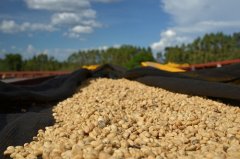The cultivation of Yunnan Fine Coffee beans the quality of Yunnan Coffee
When it comes to Yunnan coffee, perhaps the most common word we hear is "Yunnan small-grain coffee", and most of them will say "Yunnan small-grain coffee-fragrant but not bitter, strong but not strong", so many people classify the varieties of Yunnan coffee as "small-grain species". The evaluation of the taste of Yunnan coffee is naturally "fragrant but not bitter, strong but not strong". Regardless of whether it is correct or not, there is no word "small seed" among the more than 900 named coffee varieties at present, so this "small seed" is not strictly a coffee variety, it is just a nickname given to this variety by the people of Yunnan. In fact, the name of Yunnan "small grain coffee" should be called arabica--typica (Arabica-iron pickup). Or arabica--bourbon (Arabica-bourbon).

Tracing back to its roots, typica originated from Ethiopia, the ancient origin of coffee, and is the earliest original species of coffee. Bourbon is a variety of typica, both of which have rich aroma and excellent taste performance, and belong to very high quality varieties in Arabica. It is said that the coffee tree species that was first introduced into Zhukula in Yunnan is typica. When coffee was planted on a large scale in Baoshan area in the 1950s, it was also typica and bourbon. But the problem is that although these two varieties have excellent taste, they are not resistant to diseases and insect pests, are prone to leaf rust, and the yield per mu is relatively low, so corresponding to this, there are "new varieties".
The so-called new variety actually refers to catimor (Katimo), which is the hybrid of timor and Arabica of the Roberta family. Compared with the old variety, it lacks rich aroma and taste, and has a relatively shallow smell of grass and soil, but it has the advantages of resistance to diseases and insect pests, easy to manage, large yield, and its yield per mu can reach up to 350kg raw beans, which is more than twice that of the old variety.
So when Nestl é succeeded in promoting high-yield new varieties in Pu'er in the 1990s, brown farmers in Baoshan also cut down old varieties and changed them to new ones. With a round of coffee expansion, new varieties are increasing and old varieties are decreasing day by day. Finally, today's situation: the old varieties have almost been cut down, and the little ones that survived are all "old, weak, sick and disabled". Most of the trees are more than 20 years old. Over the years, the output and quality are not as good as they used to be.
Of course, if it is used to make instant coffee or general commercial beans, high-yield catimor is a good choice, but if you want to look for Yunnan specialty coffee, then the old variety of iron pickup has become the first choice because of its congenital excellent genes. Therefore, this trip to Yunnan also followed the trail of the old varieties. But the reality is really cruel. Before going, Brother Zou told me that there was an old variety in his relative's house, but what he saw excitedly was a crazy growing coffee forest, which belonged to his aunt. Because the aunt was too old and did not have the strength to replant and renovate-- these old varieties survived, but the aunt was unable to manage it alone, so he let the tree grow naturally and pick some fruit when it was ripe.
Important Notice :
前街咖啡 FrontStreet Coffee has moved to new addredd:
FrontStreet Coffee Address: 315,Donghua East Road,GuangZhou
Tel:020 38364473
- Prev

Salvadoran coffee introduces the taste characteristics of Salvadoran coffee
Salvadoran coffee refers to the coffee produced in the small South American country of El Salvador, where the coffee body is light, aromatic, pure, slightly sour, the flavor is extremely balanced, is a specialty of Central America. With sour, bitter, sweet and other taste characteristics, the best baking degree is moderate, deep. Coffee Origin in the early 1990s, guerrilla warfare greatly damaged the country's national economy and made coffee production.
- Next

Tanzania boutique coffee beans introduce Tanzania coffee producing area Tanzania coffee is unique.
Due to political instability and rampant diseases and insect pests, the coffee industry in Tanzania has been damaged, leading to a decline in the overall level of coffee and instability in quality, which in turn lead to lower prices, which are usually the result of a further decline in the coffee industry. What's more, it is estimated that more than 12% of the Arabica coffee grown in northern Tanzania from 1969 to 1985 was smuggled.
Related
- Does Rose Summer choose Blue, Green or Red? Detailed explanation of Rose Summer Coffee plots and Classification in Panamanian Jade Manor
- What is the difference between the origin, producing area, processing plant, cooperative and manor of coffee beans?
- How fine does the espresso powder fit? how to grind the espresso?
- Sca coffee roasting degree color card coffee roasting degree 8 roasting color values what do you mean?
- The practice of lattes: how to make lattes at home
- Introduction to Indonesian Fine Coffee beans-- Java Coffee producing area of Indonesian Arabica Coffee
- How much will the flavor of light and medium roasted rose summer be expressed? What baking level is rose summer suitable for?
- Introduction to the characteristics of washing, sun-drying or wet-planing coffee commonly used in Mantenin, Indonesia
- Price characteristics of Arabica Coffee Bean Starbucks introduction to Manning Coffee Bean Taste producing area Variety Manor
- What is the authentic Yega flavor? What are the flavor characteristics of the really excellent Yejasuffi coffee beans?

